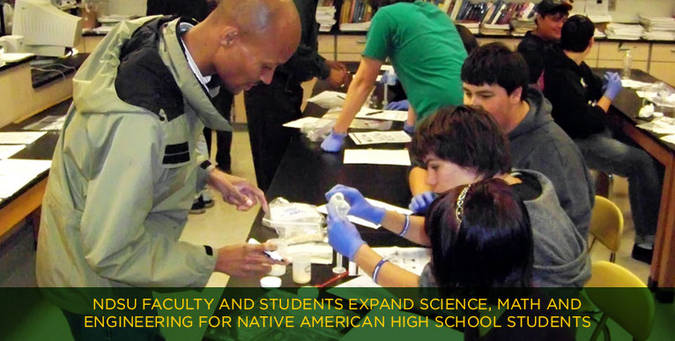 |
NDSU faculty and students expand science, math and engineering for Native American high school students
Native American high school students across North Dakota expand their understanding of science, engineering and math thanks, in part, to Sunday Academy. Through the program, NDSU professors and graduate students travel to tribal communities to share the finer points of physics, electricity and even toxic mold, with the goal to build enthusiasm for higher education among Native American students.
“We’re really building an educational pipeline to encourage students to go into the sciences,” said Deland Myers, director of the school of food systems.
Sunday Academy is part of Nurturing American Tribal Undergraduate Research and Education. One Sunday each month, from September to April, approximately 20 area high school students meet at one of the tribal colleges for roughly four hours to participate in interactive educational presentations on a variety of subjects.
For example, Myers and graduate students in the food studies department led a presentation titled, “Food safety: The Importance and Analysis of Aflatoxin in Corn.” Aflatoxin is a toxic mold found in corn that can cause a variety of ailments ranging from vomiting and abdominal pain to liver disease.
Myers’ first objective during his presentation is to demonstrate the importance of corn culturally and economically to North Dakota and the Upper Great Plains to generate interest among students. “We really try to impress upon the students the importance of the Native American culture on the things we do. A lot of the cropping methods we use today were developed by Native Americans. We just added a technological twist to it,” Myers said.
Hands-on activities also play an important part of the presentations. In Myers’ presentation, students conducted a basic test to determine the presence of aflatoxin in a sample of corn. They learned about presumptive testing, how to weigh samples, dilute samples and use test strips. Myers says his graduate students, who are a key part of setting up and teaching the workshops, like getting involved. Feedback from the high school students has been positive as well, Myers said. “They enjoy it, they like the idea of being able to work in foods. It’s something they can relate to very easily.”
This year’s other Sunday Academy presentations include: “Fun with Physics and Computers,” “How Acidic They Are,” “Hydrogen Bonding and Surface Tension of Water,” “Shapes of NATURE: Fractals,” “Laws of Electricity” and “Muscle Contraction and Grip Strength.”
To learn more about NATURE and Sunday Academy, visit www.ndepscor.nodak.edu/NATURE/sundayacad.html
NATURE Participating Institutions:
• Turtle Mountain Community College (TMCC), Belcourt, N.D.
• Sitting Bull College (SBC), Fort Yates, N.D.
• Fort Berthold Community College (FBCC), Newtown, N.D.
• Cankdeska Cikana Community College (CCCC), Fort Totten, N.D.
• United Tribe Technical College (UTTC), Bismarck, N.D.
• North Dakota State University (NDSU), Fargo, N.D.
• University of North Dakota (UND), Grand Forks, N.D.


